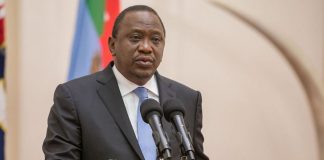
By XINHUA
Kenyan president, Uhuru Kenyatta on Monday committed to strengthening regional infrastructure in order to boost intra-Africa trade.
Kenyatta, in a speech read on his behalf by James Macharia, the cabinet secretary in the Ministry of Transport, Infrastructure, Housing, Urban Development and Public Works, told a continental forum in Nairobi, the Kenyan capital, that his government will continue to build road networks to link the northern transport corridor that connects landlocked countries in East Africa to Kenya’s port of Mombasa.

“We cannot fully benefit from the African Continental Free Trade Area (AfCFTA) without well-developed infrastructure,” Macharia said during the opening ceremony of the 7th Program for Infrastructure Development in Africa (PIDA) Week organized by the African Union Development Agency-NEPAD.
Macharia stressed that Kenya has also prioritized the development of the Lamu Port-South Sudan-Ethiopia-Transport (LAPSSET) corridor project that will provide an alternative route for the movement of cargo and passengers between Kenya and its northern Neighbors.
He believed that Africa remains highly fragmented and lack of infrastructure remains a bigger challenge to trade as compared to tariff and nontariff barriers. The official revealed that in cases where transportation of goods is conducted by road in Africa, logistics expenses account for up to 40 percent of the cost of products.
Amani Abou-Zeid, the commissioner for Infrastructure and Energy at the African Union Commission, said that no meaningful development can take place without significant investment in infrastructure, urging the continent to embrace transnational infrastructure projects that are outward-looking so as to facilitate the movement of cargo within the region.
She revealed that infrastructure projects will not only close important physical gaps but also close socioeconomic gaps that hinder creation of employment opportunities in Africa.
The African Union High Representative for Infrastructure Development Raila Odinga said that the continent has in the past decades increased its budgetary allocation toward infrastructure projects, adding that what is missing is funding from private and institutional investors both local and foreign in bridging the continent’s infrastructure deficit.